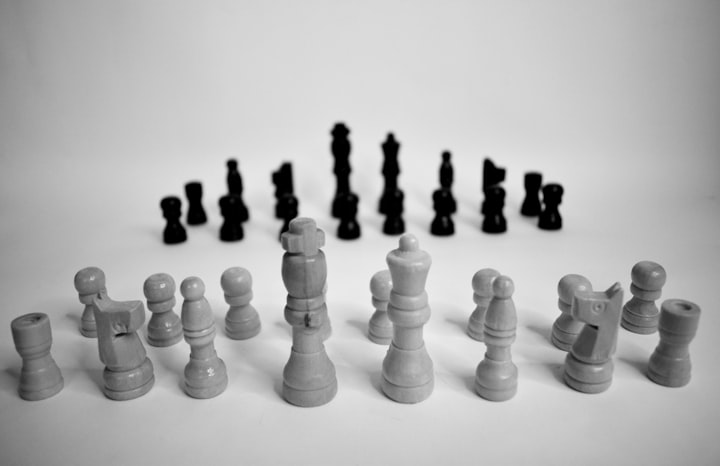A Simple Approach to Define Human and Artificial Intelligence
Before you start worrying about AI, you should consider analyzing the relationships between human intelligence and AI.

I recently started to follow an exciting and mind-bending philosophy online course at MIT called Minds and Machines.
The course is a thorough, rigorous 12 Weeks Learning Path introduction to contemporary philosophy of mind, exploring consciousness, reality, artificial intelligence (AI), and more. It is definitively one of the most in-depth philosophy courses available online that I ever frequented.
The first effect of starting study philosophy at Massachusetts Institute of Technology is that I'm asking more challenging questions… the second effect is that I'm writing more about those questions.
I'm in this moment, exploring the relationship between the mind and the body, the capacity of computers to think, the way we perceive reality, and the perspective of the existence of a science of consciousness.
As a first result, I've started to pay particular attention to one specific question that definitively has a lot to relate to my daily work as an AI expert: what is intelligence?
In this article, I will explore human and artificial intelligence concepts to find relevant similarities and differences.
A long-time question…
The idea of building devices that could simulate the movements of living beings and particularly of humans in a completely autonomous way dates back to the Upper Paleolithic.
The making of primitive dolls with movable arms was one of the first attempts to imitate living beings' gestures. Archimedes was a master in this sort of new "art."
Fantastic literature, known today as science fiction, speculated that artificial sentient beings could be made.
Robotics in recent decades has made science fiction a full-fledged science known as "artificial intelligence" or robotics.
The purpose of these researches is to create a sentient being endowed with decision-making abilities and move at will - a sentient being and to a certain extent independent of human beings., but the real question here is…
What is Intelligence?
The term intelligence comes from the Latin intelligentĭa, which, in turn, derives from inteligere. This is a word that is composed of two other terms: intus ("between") and Legere ("choose"). Therefore, the etymological origin of intelligence refers to those who know how to choose: intelligence allows to select/choose the best options for solving a question.
Intelligence is a set that forms all the intellectual characteristics of an individual, that is, the faculty of knowing, understanding, reasoning, thinking, and interpreting. Intelligence is one of the main distinctions between humans and other animals.
Etymologically, the word "intelligence" originated from the Latin intelligentia, creating from intelligere, in which the prefix inter means "between," and Legere means "choice." Therefore, this term's original meaning refers to an individual's ability to choose among the various possibilities or options presented to him.
To choose the best and most appropriate opportunity, among the various options, a person needs to evaluate to the maximum all the advantages and disadvantages of the hypotheses, requiring this the ability to reason, think and understand, that is, the basis of what forms intelligence.
Among the faculties that constitute intelligence, there is also the functioning and use of memory, judgment, abstraction, imagination, and conception.
The concepts and definitions of intelligence vary according to the group to which they refer. For example, in psychology, the so-called "psychological intelligence" is the ability to learn and relate, that is, an individual's cognition; while in the field of biology, "biological intelligence" would be the ability to adapt to new habitats or situations.
Types of intelligence
However, the Intelligence Quotient concept started to be discredited when individuals with low IQ were observed, but with great professional life success. At the same time, people considered "more intelligent" presented terrible situations.
The psychologist Howard Gardner presented the Theory of Multiple Intelligences, which claims that intelligence is a set of at least eight different mental processes existing within the brain.
According to this theory, each human being has a little bit of each one of these "bits of intelligence." In some people, there is always a specific type of process that can be more developed than in others, making it stand out in particular fields or activity areas.
Linguistic intelligence: people who can easily express themselves, orally and through writing. People with this more developed type of intelligence tend to learn other languages more easily, in addition to having a high degree of attention.
Logical intelligence: people with ease in working with logic in general, such as mathematical operations or scientific works. They usually have a good memory and can solve complex problems quickly. They can also be considered more organized and disciplined.
Spatial intelligence: people with ease in understanding and manipulating the visual world, such as 2D or 3D images. Architects and graphic art professionals develop them well.
Motor intelligence: people who can perform complicated movements with their bodies have a fantastic notion of space, distance, and depth of environments.
Musical intelligence: people who quickly identify and reproduce different types of sound patterns, in addition to creating new songs or harmonies. This is one of the rare kinds of intelligence present among people.
Interpersonal intelligence: people who are easy to lead, based on understanding the point of view and others' intentions. They are considered very active individuals who enjoy responsibilities and find it easy to convince others to do what they want.
Intrapersonal intelligence: people who can observe, analyze, and understand themselves. They can also influence people, but more subjectively, using ideas and not actions.
Naturalistic intelligence: people who can quickly identify and differentiate different patterns present in nature.
Emotional intelligence
The concept of emotional intelligence is present within psychology and was created by the American psychologist Daniel Goleman.
An emotionally intelligent individual can identify his emotions, motivating himself to persist in his goals even in frustrating situations.
Among the other characteristics of emotional intelligence are controlling impulses, channel emotions into appropriate situations, motivating people, and practicing gratitude, among other qualities that can encourage others.
Artificial intelligence
Intelligence relates to knowing how to choose the best options to solve some problem. According to their attributes and processes, several intelligence types, such as biological intelligence, operational intelligence, and psychological intelligence.
AI is also an adjective that is said of what is made by hand, art, or the ingenuity of man. The artificial also makes it possible to refer to what is unnatural or false.
Artificial intelligence was developed about specific systems created by human beings that constitute non-living rational agents. In this case, rationality is understood as the ability to maximize an expected result.
Therefore, artificial intelligence consists of designing designs that produce results that maximize performance when executed on a physical architecture.
These are processes based on specific sequences of entries that are perceived and stored by said architecture.
Devices with artificial intelligence can perform various processes analogous to human behavior, such as executing a response for each input, searching for a state among all possible ones according to action, or resolving problems through formal logic.
"AI - Artificial intelligence" is also a film made by Steven Spielberg, whose debut took place in 2001. His argument is based on the story of a robot that, when created to replace a human child, demonstrates having feelings.
Artificial intelligence or AI is a computer science branch of study that deals with developing technological mechanisms and devices that can simulate human beings' reasoning system, i.e., intelligence.
Research related to artificial intelligence is slow, but it has shown significant results on how devices can interpret and synthesize human voice or movements. There is still a long way to go before machines reach the concept as close as possible to human intelligence.
Human Intelligence vs. Artificial Intelligence
There are several differences between artificial and human intelligence, ranging from cognitive to emotional and psychological issues.
Talking about the differences between artificial intelligence (AI) and humans can be reduced because the former was created by the latter. However, there are more differences that we are going to tell you so that you will understand more how it is almost impossible for AI to surpass the natural intelligence of the human being that delves into cognitive functions such as memory, problem-solving, learning, planning, language, reasoning, and perception.
Although today both play an enormous role in improving societies, there are apparent differences.
AI is an innovation created by human intelligence and is designed to perform specific tasks much faster with less effort.
Human intelligence is best at multitasking and can incorporate emotional elements, social interaction, and self-awareness into the cognitive process. The latter is characterized by being highly complex such as concept formation, understanding, decision making, communication, and problem-solving. It is also heavily influenced by subjective factors like motivation.
Human intelligence or HI is commonly measured through IQ tests that generally cover working memory, verbal comprehension, processing speed, and perceptual reasoning.
When compared to humans, computers can process a lot more information at a faster rate. For example, if the human mind can solve a math problem in five minutes, AI can solve ten problems in one minute.
"The view that machines will think as man does reveal a misunderstanding of the nature of human thought." Ulrik Neisser.
The AI is very objective in decision-making since it analyzes using data collected purely. However, human decisions can be influenced by subjective elements that are not based only on figures.
Another difference may be that artificial intelligence often produces accurate results, as they operate based on a set of programmed rules. When it comes to human intelligence, there is generally room for "human error," as specific details can be lost at one point or another.
Human intelligence is, in general, very flexible in response to changes in their environment. This enables people to learn and master various skills. On the other hand, AI takes much longer to adapt to new changes.
The human intellect can support multitasking, as evidenced by diverse and simultaneous roles. In contrast, AI can only perform a few tasks simultaneously, as a system can only learn responsibilities one at a time.
Artificial intelligence is still working on self-awareness, while humans naturally become aware of themselves and strive to establish their identities as they mature.
As human beings, we are much better at interacting with other people, considering that we can process abstract information, have self-awareness, and be empathetic. On its way, Artificial Intelligence has not mastered the ability to pick up relevant social and emotional cues.
Human intelligence's general function is innovation, as it can create, collaborate, generate ideas, and implement. As for AI, its overall role is more of optimization, as it performs tasks efficiently according to the way it is scheduled. These are the main differences between machines and humans.
Conclusion
The idea of intelligent machines capable of reaching human intelligence levels is relatively recent compared to how long humans have been able to think. However, the advanced techniques applied not only to computer science but also to biology and engineering, among others, have already become fundamental to our society.
But modeling human intelligence from computer systems becomes a challenging goal to create sensitive and evolvable machines.
When establishing relationships between human intelligence and artificial intelligence, we must start from the hypothesis that there is a computational model of which we have more information related to its operation and memory capacity, and this may lead us to consider the possibility, in a general way, of whether artificial intelligence will surpass human intelligence in the future.
Human intelligence's general function is innovation, as it can create, collaborate, generate ideas, and implement. As for AI, its overall role is more of optimization, and these could be considered the main differences between machines and humans.
References
- Description Of The Word Of Intelligence - 900 Words | Bartleby. https://www.bartleby.com/essay/Description-Of-The-Word-Of-Intelligence-PKQSQDKVG5YW
- What is the Meaning of Artificial intelligence …. https://edukalife.blogspot.com/2015/07/what-is-meaning-of-artificial.html
- ARTIFICIAL INTELLIGENCE V/S HUMAN INTELLIGENCE! - Google-Wizz. https://googlewizz.com/artificial-intelligence-v-s-human-intelligence/
- What Kind Of Smart Are You? Question 5 - You're…. https://www.quizony.com/what-kind-of-smart-are-you/5.html
- Difference Between Artificial Intelligence & Human …. http://www.authorstream.com/Presentation/FuGenx2008-4014030-difference-artificial-intelligence-human/
- Difference Between Artificial Intelligence and Human …. http://www.differencebetween.net/science/difference-between-artificial-intelligence-and-human-intelligence/
- Howard Gardner, Theory of Multiple Intelligences
- Neisser, Ulric. "The Imitation of Man by Machine." Science 139, no. 3551 (1963): 193–97. Accessed November 28, 2020. http://www.jstor.org/stable/1710006.
One more thing…
If you want to continue to discover new resources and learn about AI, in my books (link below), I am sharing very useful knowledge, websites, and training courses online about Artificial Intelligence, Machine Learning, Deep Learning, Data Science, Business Intelligence, Analytics, and others to help you start learning and develop your career. Have a look:
This article was originally published on Medium.
About the Creator
Jair Ribeiro
A passionate and enthusiastic Artificial Intelligence Evangelist who writes about people's experiences with technology and innovation.






Comments
There are no comments for this story
Be the first to respond and start the conversation.